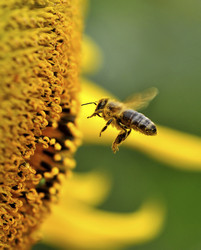Harnessing nature to achieve sustainable and efficient farming
The LIBERATION project, which began in February 2013, was inspired by the belief that agricultural inputs such as pesticides and fertilisers are not only potentially damaging to human health and to the environment, but also unnecessary. Instead, a better understanding is needed of how ecosystem services – from natural processes such as pollinating insects and nutrient cycles – can benefit the farming community both environmentally and economically. Another long term aim of the project has been simply to highlight the role – and indeed the value – of these ecosystem services in food production. The team hopes that future research will be able to capture the true value of these ecosystem services, and include them in future models of sustainable agriculture. The project began by developing a standardised methodology to assess, monitor and quantify the economic value of ecosystem services in agriculture. The goal here was to be able to more accurately compare the sustainability of different farming practices. Using this modelling approach, the team analysed on-farm management practices in semi-natural habitats in order to evaluate which methods best optimised both yield and farm income. A number of key findings are now available. The team found for example that non-traded ecosystem services such as biological pest control and nitrogen mineralisation in agriculture offer more economic value on the global scale when compared to the current cost of pesticides and fertilisers. In addition, by enhancing the contribution of these ecosystem services, farmers have an opportunity to improve the sustainability of their agricultural practices. In one experiment, the impact of high and low levels of inorganic nitrogen and insect pollinators were assessed on oilseed rape yield. The benefits to crop yield from insect pollination appeared to increase with decreased nitrogen levels. The team did note that some regions may observe a short-term loss of production. Therefore, market rewards may be required to compensate farmers for any short-term or medium-term loss of income that occurs from the adoption of practices that utilise ecosystem services. Nonetheless, in the long term, practices that enhance ecosystem services will help to optimise both the production and sustainability of farms. The project methodology, together with key findings will be collected in the form of management and policy recommendations. It is hoped that further studies will be able to use this data, and that the methodology and findings will be applied in other parts of the world. There is no doubt that global agriculture must find sustainable solutions to feeding a rapidly growing population; an additional 2 billion people will need to be fed by 2050. LIBERATION, which is due for completion in January 2017, hopes to contribute towards the search for solutions by and impact on how food production is organised in the future. For further information please visit: LIBERATION http://www.fp7liberation.eu(opens in new window)
Countries
Netherlands



